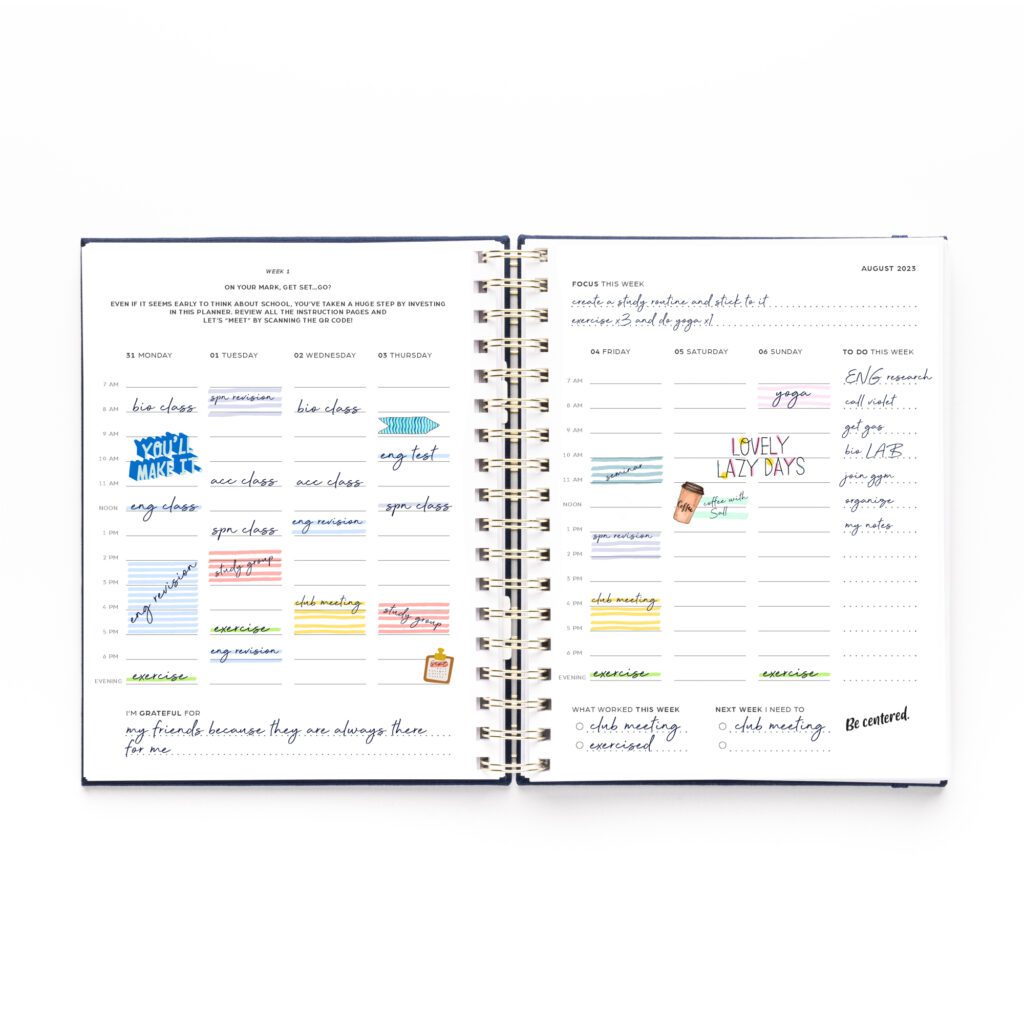Study Strategies for College Students | College Study Tips from a Professor

This post is all about study strategies for college students.
Guest post by Professor Virginia Horan
Some of the links below are affiliate links, meaning, at no additional cost to you, I will earn a commission if you click through and make a purchase. See our full disclaimer here.
I recently met with two other “mompreneurs,” who, after going through the entire process of searching, selecting, and sending their children off to college, now devote themselves to making that experience easier for other families. Each of us shared the same thought: we wish both students and parents were focused on the academic transition to college as much as they are focused on the pragmatic details (setting up the dorm room, where to buy dorm decor, etc).
Approximately 28% of students drop out of college citing time management (getting all their work done and passing classes) as a primary reason.
Students constantly hear “college is not like high school” but it doesn’t really sink in. It makes sense that the cell phone generation does not have the same concept of time that their parents did, but it’s hurting them.
Tapping into a phone is not the same as writing by hand because writing by hand activates the brain more, slows us down a bit and therefore we are more likely to remember things. Cell phone “reminders” just don’t cut it in college.
Our kids are also incredibly busy in high school so as a family, we end up managing their time FOR them by setting up carpools and getting them to all their activities and sports. As a result, they haven’t had to practice time management as much.

What parents need to convey to their children is the fundamental difference between high school “homework” and college work. I ask my students all the time if they were able to leave things to the night before in high school and they universally say yes, and that their grades did not suffer. That is not the case in college and here is the reason why:
- College assignments are designed to show SUSTAINED EFFORT. They typically cannot be done well “the night before.”
- Professors are looking for critical thinking, which means analysis and application of concepts rather than memorization, and again, that takes TIME.
- The exams are harder. To do well, a student has to be absorbing AND processing all the class material and the reading. Simply put, they need to think about what they are learning all the time!
- Papers and projects are expected to show ongoing research that took place in the weeks BEFORE the due date.
- Weak writing is highly problematic, so most students use the writing centers that are on EVERY college campus. That means leaving TIME for multiple drafts and revisions.
None of this is bad news – it’s just different. This is how we are supposed to evolve through higher education.

So how do we prepare our kids for these expectations and requirements?
Here are the top study strategies for college students and college studying tips to help make the transition from high school to college academics as smooth as possible.
1) Talk about it. Share the list above with your student and ask them what they think that means for them. It helps if they understand the “why” behind the facts. One good way to explain this is to talk about “credits.”
Most students don’t really know what that means but they know a class is 3 credits, or they need 120 credits to get a bachelor’s degree. Giving them context will help – these are “credits of MASTERY.” It is assumed that if you passed a class, you mastered the key concepts in that class.
2) Ask them what they think self-directed learning means. The answer is: since college is not “required,” it is assumed by college professors that students CHOSE to be there and want to learn. We all know nowadays that many of us feel college is a “must” but technically, it isn’t.
Intrinsic motivation is ASSUMED, and professors will not chase students down for assignments. They may never even mention a due date because it’s all on the syllabus. They may not take attendance, either. That’s NOT a good thing because students need to attend every class. That’s 75% of the answer to doing well. SHOW UP, pay attention even if it’s “boring,” and you will not be as likely to fall behind.

3) Purchase a planner for your student as a gift and SHOW THEM HOW TO USE IT. I prefer paper because ALL the research points to writing by hand over tapping into a laptop or tablet, but digital planners that require a stylus will work, too. A few years ago I looked for a planner to recommend to my students but none of them had a layout that taps into visual learning so I made my own!

It’s called The Centered Student Planner and I designed it based on my research and experience. It features a horizontal week with vertical days and time blocks, and a column for a weekly to do list. Basically, it teaches students to “see” their time and manage it better. Both the paper and digital Centered Student Planner follow a typical semester so there are weekly tips that link to video tutorials.

The tutorials provide emotional and academic support. Gen Z students struggle more than any other group with anxiety, so the planner is designed to teach them how to track their time and assignments and in so doing, give them a sense of control and lessen the anxiety.
Embedded in each week are four simple positive psychology prompts, including a gratitude list, and all four are linked to improving daily happiness. The planner consistently ranks among the most recommended planners for college students.
4) THE ALMIGHTY SYLLABUS. I cannot stress this enough. Every student gets a syllabus, which is actually considered a binding contract. Some syllabi are short, some are long but ALL need to be read. Students do not read their syllabi and it leads to them asking questions that are already answered. No college professor is interested in hearing how someone didn’t realize something was due. Many will not take late work. Even more will not give a “make-up” exam.
5) The syllabi and the planner work hand in hand. Students need to embrace “planning” and it will serve them the rest of their lives. They can map out their time every week in a planner and make “to do” lists using the syllabi they get from each teacher. They may even be able to access syllabi online before the semester starts.
6) Say NO to “All-nighters.” Every student hears that phrase “pulling an all-nighter” as if it is a rite of passage. Well, it’s a bad idea and anyone who has done it, knows that. If students can use TIME BLOCKS throughout their day, they can create the best daily routine for students where they get work done in “chunks” of time. The work slowly builds up to a natural conclusion like an exam or due date. That is how they can avoid being overwhelmed, panicking, and giving up.
The WORST thing a new college student can do is wait until the evening to do ALL their work. Evenings can be for review, organization, outlining textbook chapters, etc. But the heavy lifting needs to be done when they are “fresh.”
7) As parents, frame all of the above as EMPOWERMENT. The important thing is to not present this information as a “warning” since their anxiety is high anyway. They know it’s a big change, but they don’t know the exact How and Why behind it.
If you can explain to them that college isn’t just about the degree, but rather the PROCESS of learning it will help. If they can master the challenge of balancing their workload and the rest of their lives, they become more powerful.
Every semester in college is another step toward adulthood. College, done well, provides the perfect opportunity to “practice” all the life skills needed for successful careers – critical thinking, ability to meet deadlines, collaborating in groups, taking initiative, managing time, and being productive.



